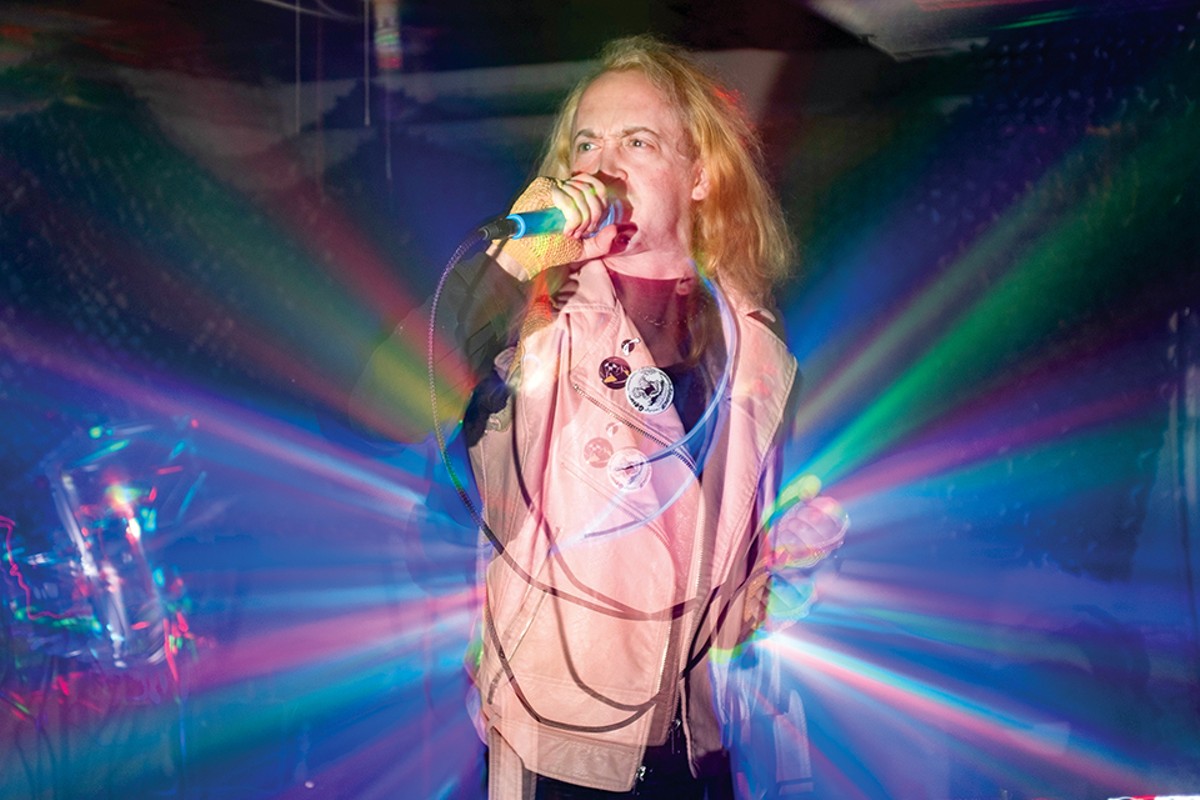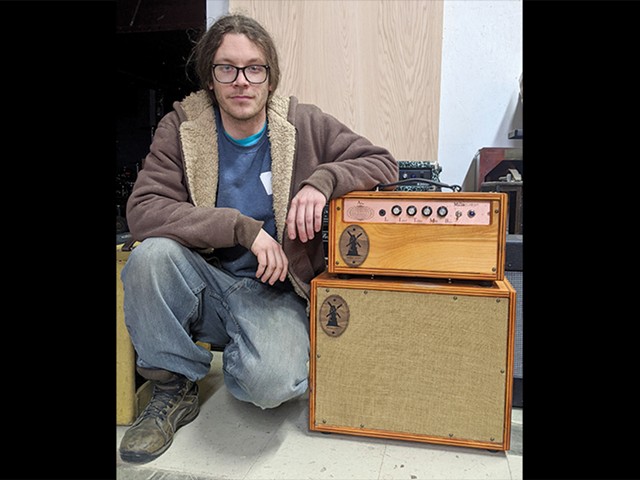If you've paid any attention to St. Louis' punk and hardcore scene over the past few years, you've undoubtedly come across Mark Plant. No stranger to the DIY community, Plant, who uses they/them pronouns, has had their hand in a number of underground musical projects for well over a decade. A polymath by nature, their musical genius and infectious energy has proven undeniable, whether it's operating synths in the shoegaze trio Nibiru, writing blistering, raw pop in Times Beach or shredding heavy in the furious punk band Dentist.
Enter the Mall, the latest project from the DIY stalwart. On debut EP Zone, set to drop later this month, you'll find hard-edged minimal wave with a punk backbone, nestling nicely between acts like Front 242, Multiple Man and High-Functioning Flesh. Plant's shouted vocals, drenched in reverb over propulsive beats and saccharine synths, tend to zero in on both beauty and anger in one fell swoop.
The culmination of years of improvised noise sets and one-off performances between their primary bands, this project finds Plant alone, opting for synchronized synthesizers and drum machines where other players once raged.
"In Nibiru, I used that big poly-synth and a drum machine and played all of those while singing," explains Plant. "All I could do was stand behind the table and sing into a microphone, and I felt like it was very confining, so now I'm trying to be visible and move. It's a little less complicated."
It was with a direct approach to song structure and an exploratory knowledge of programming gear that Plant found what worked for this new endeavor.
"The more rules I made, the easier it was to make stuff — outline everything," Plant explains. "'This song doesn't sound finished.' 'This song needs to be finished.' 'The lyrics suck.' 'Does this need words?' It's like with electronic stuff, you can have infinite options, so it's much easier to make those rules beforehand, and be like, 'That's it,' and get a song done. Lots of rules. That's the only way anarchy works, too."
In just four short months, Plant has been working at a breakneck pace, writing songs, maintaining a comically insane social media presence and planning a spring tour. Their hard work and seemingly endless stream of creativity has resulted in Zone, a self-released cassette filled with seven tracks of music perfect for cruising the contemporary hellscape of America or hardstomping under a disco ball. It is through these songs that Plant was able to confront the challenges of capitalism, worldly strife and the woes of existence. And unlike the demure, whispery nature common to the genre, Plant's vocals sit perfectly front and center, just begging to be heard.
In regard to their songwriting process, Plant explains: "Really if something hits me, if something is bothering me, if I get stuck on an idea or a concept — which happens all the time — I'll just talk to everyone for the next three days about the thing I'm stuck on. I'll even write stream of consciousness [lyrics]. I want it to be pretty. They're still pop songs. I just am mad."
Although the Mall thoroughly explores many types of subgenres within the electronic dance music canon, Plant explains that their roots in hardcore punk may not be far off from their material today.
"Breakdowns in hardcore bands ... [they're] totally just dance parts. The Mall is just skipping the fast parts, and it's literally breakdowns where it's understood that you're dancing," says Plant. "This idea that it's so tough — and it's just like dance music. That's the part everyone's waiting for anyway. Why don't we just play dance music?"
As Plant continued to write songs over the past few months, they quickly understood that producing electronic dance music requires a high level of quality in live sound — something often not found in basements and DIY venues across town. It was through this realization that Plant traded in numerous pieces of gear for a PA system that not only could support their own music, but also that of the community they hope to foster.
"If you're in a punk band, you get a guitar amp, and you do everything you can so your guitar sounds good at a show," Plant says. "If you're a drummer, you have to buy expensive cymbals. To me, I always had the idea: If you're a vocalist in a band, get a PA, and if you play a basement show out of town and the PA sounds bad — that's on you. If I have that PA, that means that other people that want to make electronic music can have it sound good. Especially here in St. Louis. You can start something like that and just never play a good show ever because you'll just never play on a good PA."
It is with this drive, punk ethos and level of self-sufficiency that Plant is currently mapping out a tour that will take them throughout the South and up the mid-Atlantic this spring. As a veteran of the road and tour life, Plant understands the urgency to ride the project's momentum and bring their music to audiences both regionally and nationally.
"I'm playing my first show in February, but also these are skills I've been building on for so long, and I'm finally doing something. I'm very proud of this," Plant explains. "Like anything that's super niche, I feel like the audience is so small. There's a lot of other people thirsty for that that just need to hear that it exists. So you have to go to other cities immediately.
"It's important to not just sit in one spot," they continue. "If you're making something that you know is good, you need to show it to people, or you're doing those people a disservice. Because they need that perspective."






